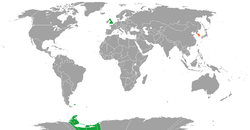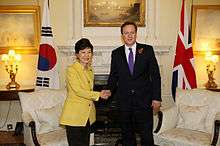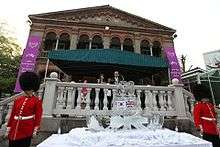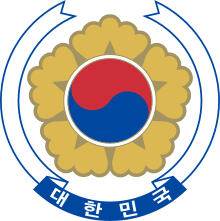South Korea–United Kingdom relations
The relationship between the Republic of Korea and the United Kingdom of Great Britain and Northern Ireland spans from the 19th century to the present day. Although the Republic of Korea gives 18 January 1949 as the date of the establishment of formal relations with the United Kingdom,[1] diplomatic ties go back to 1883.[2] British military participation in the Korean War during the 1950s was significant, but relations between the two countries at the time were described as "tenuous", with relatively little known about each other. Commercial and trade relationships grew rapidly during the 1970s. During the Asian Financial Crisis in the late 1990s, Queen Elizabeth II made a state visit to South Korea, which was well received at a time of crisis in the country. Today, there are strong economic and diplomatic links between the two countries.[2][3]
 | |
United Kingdom |
South Korea |
|---|---|
| Diplomatic mission | |
| British Embassy Seoul | Embassy of South Korea, London |
| Envoy | |
| Ambassador Simon Smith | Ambassador Enna Park |


According to a 2014 BBC World Service Poll, 74% of South Koreans view the United Kingdom's influence positively, with 14% viewing the UK negatively. On the other hand, opinion of South Korean influence is divided in the United Kingdom, with 45% of Britons viewing South Korea's influence positively, and 45% viewing them negatively.[4]
History
The United Kingdom occupied Geomun Island, and renamed it as Port Hamilton in 1885. The relationship between the two nations had broken off during the Korea under Japanese rule between 1910 and 1945. After the World War II, South Korea established diplomatic ties with the United Kingdom on 18 January 1949. The United Kingdom and other British Commonwealth Forces fought alongside South Korea during the Korean War. Almost 100,000 British servicemen fought in the Korean war. Their most famous involvement was the Battle of the Imjin River, a confrontation with Chinese soldiers. 600 soldiers of the British Army took on a force of 30,000 Chinese troops crossing the Imjin River in Korea. At the end of the battle 10,000 Chinese troops had fallen. British losses stood at just 59 and this battle is considered a turning point in the war as it halted the Chinese advance. The Gloucester Valley Battle Monument is a memorial for British soldiers killed at Solma-Ri, South Korea. 1,078 British soldiers died fighting in the Korean war.
There is a British embassy in Seoul and a South Korean embassy in London.[3][5] The UK and South Korea cooperate in world events with other nations such as the United States. They have recent military relations and the UK often supports South Korea's view during periods of turbulent North Korea–South Korea relations. There were about 17,000 South Koreans living in the United Kingdom in 2011.
In November 2016, the Republic of Korea Air Force conducted a domestic air combat manoeuvering exercise with the British Royal Air Force and the United States Air Force. This was the first such exercise with a foreign nation other than the United States.[6][7]
High-level exchanges
From the Republic of Korea to the United Kingdom:
- 1986 April President Chun Doo-hwan
- 1989 November President Roh Tae-woo
- 1995 March President Kim Young-sam
- 1998 April President Kim Dae-jung
- 2001 December President Kim Dae-jung
- 2004 December President Roh Moo-hyun
- 2006 February Minister of Foreign Affairs and Trade Ban Ki-moon
- 2006 June Minister of Foreign Affairs and Trade Ban Ki-moon
- 2006 May Deputy Prime Minister for Economic Affairs Han Duck-soo
- 2007 May Deputy Prime Minister for Economy Affairs Kwon Oh-kyu
- 2007 June Chairman of Financial Supervisory Service Yoon Jeung-hyun
- 2008 May Chairman of Financial Supervisory Service Jeon Kwang-woo
- 2008 May Minister of Strategy and Finance Kang Man-soo
- 2008 October Presidential Special Envoy Sa-Kong-il
- 2009 Febreary Presidential Special Envoy Sa Kong-il
- 2009 April President Lee Myung-bak (G20)
- 2010 January Minister of Foreign Affairs and Trade Yu Myung-hwan
- 2010 May Minister of Health and Welfare Jeon Jae-hee
- 2013 April Special envoy of the President Former Prime Minister Han Seung-soo (to attend the funeral of former British Prime Minister Margaret Thatcher)
- 2013 November President Park Geun-hye
- 2014 December Minister of Foreign Affairs and Trade Yun Byung-se
From the United Kingdom to the Republic of Korea:
- 1986 May Prime Minister Margaret Thatcher
- 1992 November Prince Charles and Princess Diana
- 1996 March Prime Minister John Major
- 1997 April Duke of Gloucester
- 1997 October Duke of Kent
- 1999 April Queen Elizabeth II
- 2000 October Prime Minister Tony Blair
- 2003 July Prime Minister Tony Blair
- 2001 April Duke of York
- 2005 November Duke of York
- 2006 October Deputy Prime Minister John Prescott
- 2008 September Duke of York
- 2008 December G20 Special Envoy Timms
- 2009 October Minister of Business, Innovation and Skills Peter Benjamin Mandelson
- 2010 November Prime Minister David Cameron
- 2012 March Deputy Prime Minister Clegg (to attend Seoul Nuclear Security Summit)
- 2013 October Secretary of State for Foreign and Commonwealth Affairs William Hague (to attend Seoul Conference on Cyberspace 2013)[1]
References
- Ministry of Foreign Affairs, Republic of Korea. "Ministry of Foreign Affairs, Republic of Korea-Europe". Ministry of Foreign Affairs, Republic of Korea. Archived from the original on 15 July 2015. Retrieved 29 April 2016.
- Sir Thomas Harris, former British Ambassador to South Korea (27 June 2014). "Britain's Relations with Korea: A Personal View". Gresham College. Retrieved 15 July 2015.
- "UK and South Korea". Retrieved 29 April 2016.
- https://downloads.bbc.co.uk/mediacentre/country-rating-poll.pdf
- "Embassy of the Republic of Korea in the United Kingdom of Great Britain and Northern Ireland". Retrieved 29 April 2016.
- "'Invincible Shield' - First ever UK-US-ROK Combined Air Exercise". RAF. 8 November 2016. Retrieved 24 December 2016.
- "Invincible Shield Military Drill Against North Korean Threat: US, UK, South Korea To Begin Trilateral Exercise". International Business Times. 2 November 2016. Retrieved 24 December 2016.

